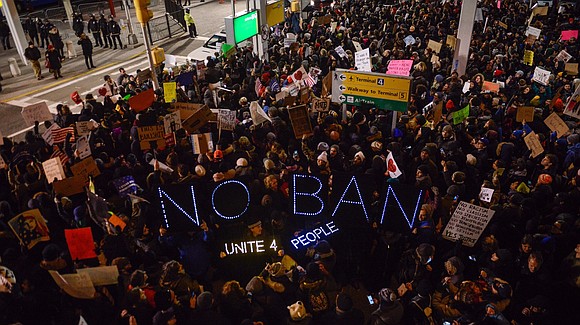Judges Address Legal Future Of Travel Ban Wednesday
CNN/Stylemagazine.com Newswire | 3/15/2017, 12:30 p.m.
(CNN) -- President Donald Trump's new travel ban is scheduled to go into effect Thursday, but several federal judges across the country may decide its legal fate just hours before midnight.
Trump's new executive order bans foreign nationals from six Muslim-majority countries from entering the US for 90 days and bans all refugees for 120 days. But unlike his original executive order from January, those with green cards or valid visas are exempted from the ban.
Despite these changes, several states and immigration advocates say the new order still suffers from legal flaws and have asked federal judges to weigh in by issuing temporary restraining orders blocking the ban before Thursday.
Courts in Maryland and Hawaii agreed to hear oral arguments from both sides Wednesday and could issue decisions the same day.
Here are the issues at play:
How different is the new executive order?
Despite the fact that the President's senior policy adviser said the revised travel ban would have "mostly minor technical differences" from the iteration previously blocked by the courts, the Justice Department's position is crystal clear: the new executive order is "substantially different."
DOJ has argued in legal filings this week that challengers to the new order have no legal claim because: visa holders are now protected and exempted from the travel ban, the only foreigners who are excluded have no constitutional right to enter the US, and the new executive order contains "robust waiver provisions," granting entry on a case-by-case basis for those who do not pose a national security risk, in any event.
Can states still sue?
Several of the states challenging the new executive order claim that it harms tourism and negatively affects foreign students for public universities.
The Justice Department says that argument is "mere speculation."
For instance, "Hawaii does not identify any particular persons it seeks to recruit who have concrete plans to relocate to Hawaii and join a state university or agency -- let alone specific plans to do so in the next 90 days," DOJ attorneys argue in legal briefs. "Rather, the most Hawaii can say is that unidentified aliens might aspire to do so someday."
Confusion at airports again?
When the new executive order was signed last week, administration officials told reporters that the new order included a 10-day "phase-in" period to ensure that those traveling "aren't placed in legal jeopardy," and in the hopes of avoiding the "chaos" seen at airports after the first travel ban was signed.
But now that judges have scheduled hearings to hear challenges to the new order Wednesday -- just hours before it is slated to go into effect at 12:01 a.m. on Thursday -- travelers at airports could experience confusion once again if any judge blocks the new order, either in full or in part.
The Department of Homeland Security did not immediately respond to a request for comment for this story.
For more information go to http://www.cnn.com










